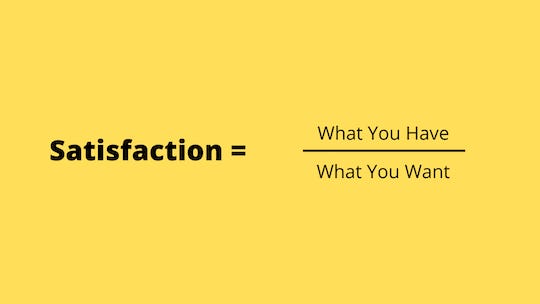Thought I'm Wrestling With: The Quiet Cost of Being Rushed
Why slowing down might be the fastest way to build a life worth remembering.
Thought I’m Wrestling With: How Rushed Do I Want to Be?
Almost a decade ago, I watched a video clip on YouTube with Katrin Davidsdottir, a two-time CrossFit world champion. The interviewer asked what her perfect day looked like. Her response?
"A day where I’m not rushed."
I didn’t write it down or bookmark the clip, but I can still hear her saying it like it was yesterday. Probably because I resonated with it so deeply.
But why? No one really enjoys the feeling of being rushed (even procrastinators), but I’d never heard it framed as something to avoid—not just an inconvenience, but a root cause of other negative emotions and experiences.
Yesterday, I was reading a Modern Wisdom newsletter where Chris Williamson wrote about time: how some days feel like years, and some years feel like days. It captured a subtle reality of adulthood—the novelty of our youth gives way to routine, structure, and repetition. Our brains prefer it that way. It conserves energy.
Imagine if every day were completely different. Your route to work changed constantly. Your breakfast varied dramatically. New faces greeted you at the gym every class.
That probably triggers anxiety in a few readers—and understandably so. Humans are creatures of habit. We need some novelty, but not too much. Chaos is no way to live, no matter how thrilling it might seem.
Chris pointed out that routines compress time in our minds. When our days follow familiar patterns, the brain essentially goes on autopilot to conserve RAM. There’s nothing novel to encode, so we don’t remember much.
As we get older, days seem to fly by not because they’re short, but because they’re forgettable.
On the flip side, we all remember our youth vividly. Vacations. New classrooms. Amusement parks. The novelty triggered more cortical activity, which formed distinct memories.
This ties into the Holiday Paradox: time flies when you're having fun, but it feels long in retrospect. And the inverse is true—boredom crawls in the moment but disappears from memory.
Which leads to this insight: the more memories you generate, the longer time feels in hindsight. Our remembered time expands in proportion to novelty.
So what does memory have to do with being rushed?
At 2 a.m. last night, I scribbled this thought in a notebook: "Being rushed = being outcome-oriented."
When you’re focused on outcomes, you become a passenger in the present. You only "arrive" when you hit the milestone—or when you fail. The process itself becomes forgettable. Your brain has no reason to record it.
(Quick note: I’m not talking about emergency situations. I’m talking about the cultural pace we’ve normalized. The always-on, go-go-go mode that tells us we’ll be left behind if we slow down.)
Whenever I feel rushed, it’s usually because I’m trying to please someone else—or accomplish something I’ve deemed critical. But that urgency is self-created.
If I had $1 billion in my bank account, would that last-minute assignment from my boss feel as critical? Probably not.
If I’m late to coffee, the coffee won’t taste worse. I’m just worried about what the other person will think.
I even feel rushed typing prompts into ChatGPT. I’m so eager for an answer that I barely think through the question. As if sending it 10 seconds sooner will save the world. How ridiculous, Mitch.
In doing that, I skip the very activity where the value lies. Reading and writing are where insight happens—not when you click "send."
Rushing cheats us out of reflection. It’s a scarcity mindset. It puts more value on others' expectations than on your own presence.
When I look back, almost nothing I rushed actually needed to be rushed. The urgency was usually a fallacy—an illusion I mistook for reality.
Have you ever looked back and thought, “Good thing I rushed that decision”? Probably not. If anything, those are the memories we don’t have—because the brain didn’t deem the process meaningful enough to store.
(Some might argue: "I have to rush. I have bills to pay and a boss to please." And yes, I get that. But we all chose the jobs we’re in. I’m not saying it’s easy to change, but the first step is ownership. You chose your current path. That means you can choose differently.)
Arthur Brooks, a professor at Harvard, has a formula for satisfaction:
So here’s a question: can you really feel rushed for something you already have?
Maybe there’s an exception, but I can’t think of one.
What we have is often more abundant than we realize. What we want, on the other hand, is adjustable. We can shrink that denominator through self-reflection and alignment. I’m not saying zero wants—but endless wanting guarantees dissatisfaction.
So next time you feel rushed, pause and ask: “What am I chasing? What do I already have?”
Sometimes the rush is subtle. Like when I fold laundry fast just to "earn" my relaxation. Or when I try to clear my to-do list so I can finally enjoy the day. But if I treat life like a series of hurdles to get past, I never arrive anywhere worth being.
Joe Hudson has a beautiful reframe: “Enjoyment isn’t what you’re doing—it’s how you’re doing it.” His go-to question is, “How can I enjoy this moment 10% more?”
That mindset anchors me in the present. It pulls me out of performance mode and into participation.
So that’s my goal: to catch myself when I feel rushed, name the driver, and ask—do I keep going, or do I slow down?
I don’t want to eliminate urgency. But I want the kind that creates stories worth remembering.
Till next time.




This is exactly why the very first thing I have people do when building a mental fitness routine is slow down!